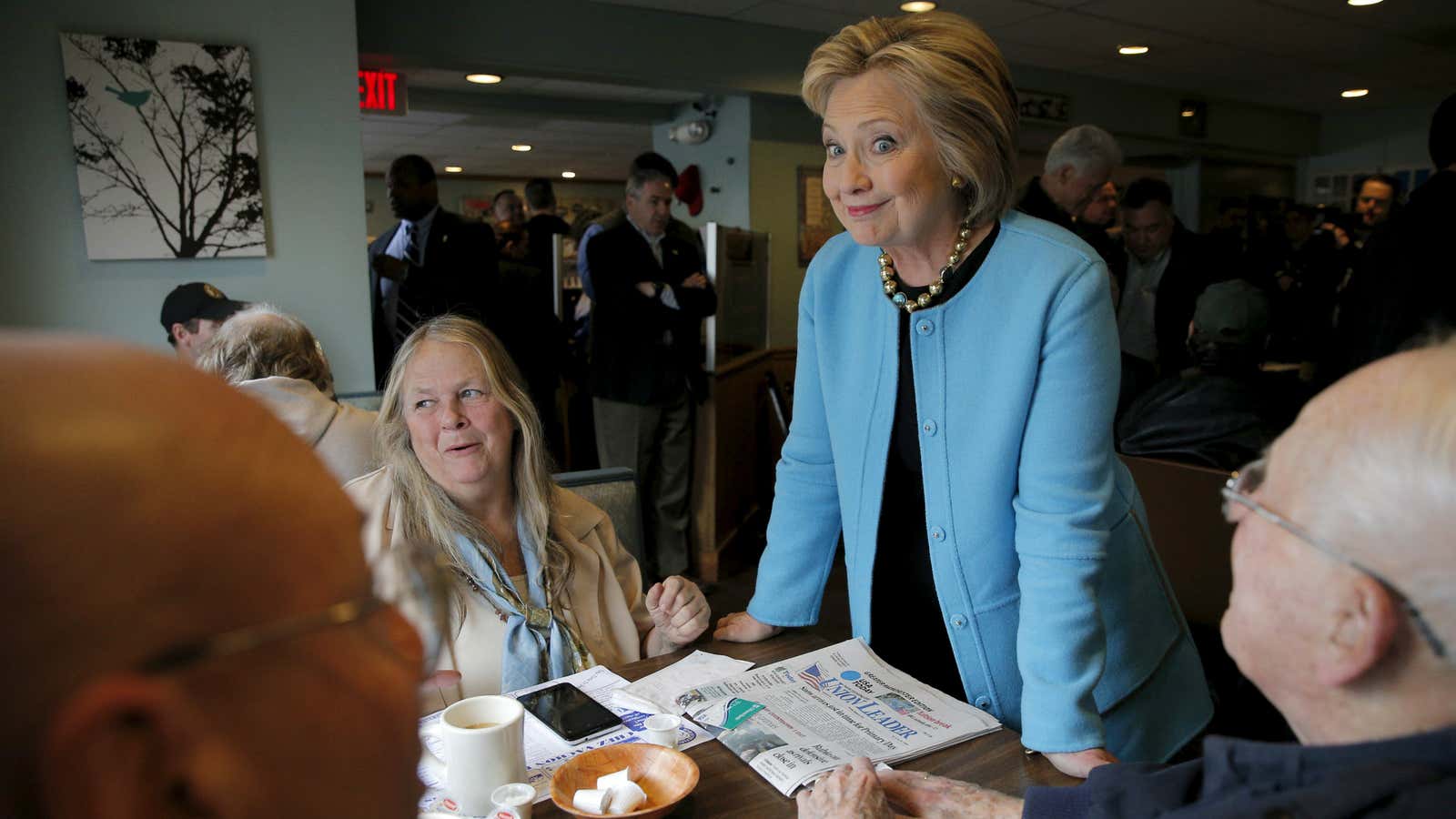This question originally appeared on Quora: What are some words the media is using to describe Hillary Clinton that are unnecessarily gendered or sexist? Answer by Laura Hale, female.
There are a couple of media companies, non-profits that focus on media fairness or discrimination, universities, and academic papers that have provided really comprehensive lists of sexist words when applied to female politicians (for example here, and here, and here, and here). I’m going to borrow from these a bit and try to contextualize the issue. One issue with finding examples of sexist language is there is so much discussion on this topic that it actually buries a lot of primary examples, and I refuse to dive that deeply into right-wing American news sites.
Ever heard of balls? These are male testicles. If you’ve got balls, you’ve got guts, moxie, courage, nerve, bravery, self-assurance, confidence, determination, stamina, spunk. You’re not afraid to take a stand. When you see “balls” being used around Clinton, you’re often seeing a subtle form of gendered and sexist language. I mean, how often do you hear a talking head describing a politician of any gender with, “He’s really got a set ovaries. I don’t know any other politician that has the courage to do that.” Having ovaries is not used the same way, and it defines courage as a masculine-only attribute based on biological characteristics. Or at least, it suggests that.
The graph above shows this phrase is not uncommon on blogs and in news articles that reference her. This tends to appear more in quotes and in regards to men competing against Hillary.
A day before the GOP debate, Donald Trump talks national security aboard a battleship, helpfully quotes two guys who like Trump because he “has balls.” Hillary, on the other hand, “destroyed the world,” according to the people quoted.
Another problematic word that is used in a gender-negative way for women is “aggressive.” It sits alongside “pushy” in terms of being sexist and gendered. Men tend to get more favorable, positive words: He’s ruthless. He’s cutthroat and relentless. She’s aggressive and pushy.
And on blogs, both are used to describe Hillary Clinton with some regularity. “Is Bernie Sanders More Electable Than Hillary Clinton?” helpfully points out that “Clinton operatives have said she faces a backlash from Sanders supporters and other core Democratic voters if she gets too aggressive in her attacks.” Why? Because aggression is bad in women. “Dems Face Off at ‘Black and Brown’ Forum“ says,
Asked if Clinton is getting more aggressive, Sanders responded with a long, drawn out, “Yes.” Why? “It could be that the inevitable candidate for the Democratic nomination may not be so inevitable today,” he said. Earlier in the day, he said the attacks were a sign that Clinton’s campaign is in “serious trouble.”
It then goes on to refer to aggression as attacks. Clinton is aggressive and attacking. Again, culturally, these are not seen as positive traits in women. Women get fired for being pushy and aggressive. Men don’t.
Bimbo and bitch are another pair of problematic words. Bitch is an insult aimed at women—one almost always insulting them for being willing to stand up for themselves—or one leveraged by guys who feel threatened by women. When a woman doesn’t do what a misogynistic guy wants, he often refers to her as a bitch. Bimbo tends to be used for women exclusively, and imply that she’s not “all there,” and that she’s sexually loose. The bimbo is the dumb woman who sleeps with any man who moves, like Bill Clinton. Neither are complimentary. Men are sometimes called bimbo, but at a much, much, much lower rate. Bitch is almost never used for guys. When people “bitch,” they are complaining—apparently a feminine attribute. Real men don’t bitch out other men.
The above graph gives some visual support to these ideas, though I’d bet lots of those Bernie “bimbo” and “bitch” references you see peaking above Hillary are not actually referring to him. Lots of this, though, refers to Bill Clinton’s “bimbos” for both. It’s kind of sexist to be blaming Hillary for who Bill Clinton sleeps with.
And no one is really searching for “bitch” plus “Bernie Sanders” according to Google Trends. Both words are used frequently by conservative media, including Breitbart’s site.
That said, the right wing has also been using gendered words to challenge Sanders, questioning his masculinity. In “Sanders Boasts He Has Better Chance Against Trump Than Clinton,” Breitbart says that “Instead, he talks about the urgency of ‘normalizing relations with Iran,’ with a dose of the same passive-aggressive bitching about Tehran’s support for terrorism that he uses to remind his voters about Clinton’s Goldman Sachs speaking fees.” Hillary Clinton isn’t alone in being attacked with gendered and sexist language—lots of the media also use this tool to attack men, basically insulting them for acting like women. “Catfight” is an example of this. Men brawl. Women take out their longer fingernails, scratch each other’s eyes out, and catfight. Cruz and Trump both “catfight” during the debates. The media has described Hillary and Bill has having catfights with Bill’s bimbos.
Another word the media uses that can be sexist in context is “female,” especially when the other word being used is “man.” “Clinton will be the first female president”—I can’t recall ever seeing people describing Obama as the “first black male president.” This one is perpetrated a lot by men. ”Mrs.” when Mr. is not used. “Glenn Reynolds: We just might get that Trump-Sanders race“ is one example—Reynolds refers to Mrs. Clinton and Mr. Obama, but never Mr. Sanders.
There are a lot more, but those are the most immediate references that come to mind for problematic terms being used to describe women.
You can follow Quora on Twitter, Facebook, and Google+.
More from Quora:
As a female, when was the first time you felt discriminated against because of your sex?
Will people vote for Hillary Clinton because she is a woman?
